2018 Washington County Annual Report
Local Partnership
The partnership between the University of Maine, County Governments and the county Extension Associations has endured for over a century. As the needs of the people of Maine have changed, so has Cooperative Extension. We are committed to helping Maine succeed across our spectrum of programming. However, success is best achieved by collaboration with the people, businesses, organizations and communities that we work with. Extension is a reflection of the locally identified needs that form the basis for the educational programs that are offered statewide.
The county report is an important way to share the work that has been happening locally and statewide. This report is also an important way that the county Extension Association documents accountability for the investment of funds from County Government. We are very pleased to share this report with you and encourage you to contact your local office with questions or for more information on anything in this report.

— John Rebar, Executive Director
Washington County Extension Association
Executive Committee
President: Wendy Harrington
Vice President: Hope Carle
Secretary: Lynn Mitchell
Treasurer: Gretchen Cherry
Members: Richard East, Kathy Mayo-Reese, Marianne Moore, Dana Mitchell
Washington County Staff
Louis Bassano, Regional Small Business Extension Educator
Sandy Copel-Parsons, 4-H Community Education Assistant
Deborah Gardner, Administrative Assistant
Jennifer Lobley, 4-H and Volunteer Development Extension Educator
Alan Majka, Nutrition and Health Extension Educator
Marjorie Peronto, Home Horticulture Extension Educator
Tara Wood, Administrative Assistant
Washington County Highlights
Maine Food Systems
New Eat Well Volunteers Program Started in Cherryfield
The Eat Well Volunteers Program was created by Cooperative Extension staff to help expand our nutrition education outreach in food pantries. Modeled after the Master Gardener Volunteers program, Eat Well Volunteers receive research-based training in basic nutrition, food preparation and food safety. Once trained, they conduct demonstrations and distribute fresh produce at local food pantries. Our goal is for food pantry clients to consume more fruits and vegetables and develop stronger food self-sufficiency skills as a result of our outreach. With support from a grant from Maine Community Foundation in 2017, Eat Well Volunteers conducted demonstrations and distributed produce on a bi-weekly basis at Maine Sea Coast Mission Food Pantry in Cherryfield. The volunteers were able to make a total of 200 educational contacts with food pantry clients! Clients reported greater confidence and higher likelihood to incorporate fresh produce into their meals as a result of their interactions with Eat Well Volunteers.
Master Gardener Volunteers Feed the Hungry, and More
Fourteen Master Gardener Volunteers worked to tackle food insecurity by growing and gleaning over TWO TONS of vegetables and fruits for emergency food relief in Cherryfield, Machias, Milbridge and Jonesboro. Master Gardener Volunteers also coordinated three community historic garden projects: The Gates House Garden in Machiasport, the Pembroke Historical Society Herb Garden, and the Lubec Fisherman’s Memorial Garden. Collectively, Washington County Master Gardener Volunteers contributed 708 hours of labor valued at $15,950 in 2017!
A Master Gardener volunteer taught two beekeeping courses, introductory and intermediate sessions. Participants gained knowledge about hive organization, pests, diseases and equipment.
Since 2013, 116 participants have completed the Beginner Bee Course.
Diabetes and Obesity Prevention
Diabetes rates are alarmingly high amongst the members of the Passamaquoddy Tribe. Eighteen percent of all adults, and 49 percent of those between the ages of 45 and 64 years, have been diagnosed. In collaboration with the Pleasant Point Health Center and Beatrice Rafferty Elementary School, 28 first and second grade children participated in a twelve-session adaptation of Health is Life in Balance, Diabetes Education in Tribal Schools program. After completion, students were able to recite concepts of balance between body, mind, feelings and world; balance between diet, physical activity and body fat; description of diabetes; and how to prevent diabetes through healthful eating and physical activity. They also reported being motivated to act on what they learned and sharing what they learned with family members. Since 2015, every child who passed through first and second grades at Pleasant Point and Indian Township elementary schools have participated in the program.
Dining with Diabetes Down East
Dining with Diabetes Down East has been offered in nine communities to a total of 289 people. Between July 1, 2017 and June 30, 2018, 62 adults participated in programs presented in Gouldsboro, Machias, Houlton, and Ellsworth.
A Dining with Diabetes website was launched in 2018 that includes a series of seven videos and four online publications. Publications address introduction to simplified diabetes meal planning, how to eat to control blood sugar, how to eat to control blood pressure and how to eat to control blood cholesterol. These are the primary risk factors for diabetic complications. This will expand the reach of diabetes education to those who are unable to participate directly in the Dining with Diabetes Down East program. You may visit the website here-https://extension.umaine.edu/food-health/dining-with-diabetes/.
Participant Quote “I went to the diabetic teaching classes you taught in Eastport this summer and I wanted to let you know how much you helped me get my diabetes under control. Before I came to your classes, I was taking medication for my diabetes in the morning and at night and I’m happy to report that I now take no medication for it at all! I started really watching what I was eating and that, along with exercising every day, made all the difference. My glucose levels stay pretty consistent all day, running from about 80-120. I’ve lost about 25 pounds and I feel great. Thanks for helping me understand what I needed to do to get these results. It was a great program and I’m glad you took the time to teach it.” (October 10, 2017 email message)
289 have participated in Dining with Diabetes Down East
Food Safety
UMaine Extension is a resource for individual consumer questions regarding home food safety and preservation, and testing home pressure canner gauges for accuracy as well as nutrition and food safety presentations.
Cranberry Assistance Provided to Washington County Growers
Extension’s Cranberry Professional assisted our county cranberry growers with pest monitoring and informed them about some insecticides–new and old–that received a cranberry label for use this season. Any other updates to the Maine Cranberry Integrated Pest Management Guide were also shared with them before the start of the 2018 season. Four cranberry farms in particular received some very timely help in late May and early June, in person, when one of the key cranberry pests was just beginning to show up on their beds, making it far easier for the growers to stay on top of controlling that particular pest.
Lily Calderwood Hired as Blueberry Specialist
Dr. Lily Calderwood’s first day as UMaine’s Wild Blueberry Specialist and Assistant Professor of Horticulture was Monday, March 12, 2018.
Lily’s is succeeding long-time Wild Blueberry Specialist, Dr. David Yarborough with a year overlap to learn as much from Dave as possible about Maine’s wild blueberry crop and growers.

2017 Wild Blueberry Annual Field Day
The annual summer field day for wild blueberry growers was held on July 19, 2017 at the Blueberry Hill Farm in Jonesboro. A discussion with blueberry growers, processors, and University and government employees affiliated with the blueberry industry on the wild blueberry crop took place. There were presentations on recent research. Three recertification credits were provided to certified pesticide applicators attending the meeting.
2018 Wild Blueberry Spring Meeting
In April 2018, the Wild Blueberry Spring Meeting was held at the University of Maine at Machias. The agenda for the day included an update from the Wild Blueberry Commission; blueberry crop trends 1996- 2017; management of spotted wing drosophila; wild blueberry disease update, and Wild Blueberry Management Tool demonstration.
Integrated Crop Management Field Training Sessions
Annual field training sessions were offered at three locations to demonstrate and discuss the Integrated Crop Management (ICM) field scouting techniques. The first and second session covered mummy berry blight identification and monitoring, insect sweeping and identification, and weed identification and management. The third session discussed blueberry maggot fly trapping, spotted wing drosophila ID and trapping, leaf and soil sampling, leaf spot identification and monitoring and weed identification and management.
Sustainable Ecological Aquaculture Network provides research, training and education in Washington County
The University of Maine’s Sustainable Ecological Aquaculture Network program is providing information on oceanographic conditions and tech transfer in aquaculture production for use by marine businesses in Washington County.
Understanding how different types and scales of marine aquaculture fit into Maine’s working waterfront and how these businesses can utilize existing environmental and socioeconomic conditions is key to the expansion of the aquaculture industry sector.
University of Maine received a $20 million grant from the National Science Foundation to create the Sustainable Ecological Aquaculture Network (SEANET) that will increase research and development for aquaculture expansion from 2015-2019. The focus in year four of the program has centered on Washington County and includes the deployment of five buoys in Machias Bay and Cobscook Bay that provide oceanographic information for use by marine businesses, researchers, and educators. Chris Bartlett, Marine Extension Team, has been providing logistical support and community outreach for SEANET activities in this area.
Impacts from SEANET will be realized after the program’s completion in 2019. Information from the oceanographic buoys is currently being used by Cooke Aquaculture USA and other marine businesses for management decisions. Data from the buoys can be accessed here.
Maine Sea Grant Educator Chris Bartlett also received a Seed Grant from SEANET for workforce development that supported a high school sophomore in establishing a kelp aquaculture business in Eastport. This grant included field trips to the kelp farm for 97 students and staff from Rose Gaffney Elementary School and Shead High School in May, 2018 (photo below).
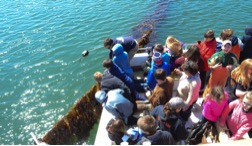
Aquaculture in Shared Waters program delivers comprehensive education in Machias
Aquaculture in Shared Waters provided comprehensive training in marine aquaculture business development to 24 individuals over a thirteen-week period in Machias.
Applications for Limited Purpose Aquaculture Licenses from Maine Department of Marine Resources have jumped from 35 in 2013 to 197 in 2017, with efforts spreading from west to east along Maine’s coastline. Education of new and existing aquaculturists remains a high priority for State agencies and industry leaders as the sector rapidly expands. Aquaculture in Shared Waters delivers comprehensive training on topics ranging from site selection and production techniques to business management, sales and marketing, and public health.
The course was held for the first time in Washington County during the winter/spring of 2018, with 24 people participating over a 14-week period. This was the seventh offering of Aquaculture in Shared Waters since its creation in 2013 with a total 130 participants. Partners included Coastal Enterprises, Inc., Downeast Institute, Maine Aquaculture Association, Maine Aquaculture Innovation Center, and University of Maine. Funding was provided by USDA Rural Business Development Grant Program. Aquaculture in Shared Waters has also been the subject of an ongoing social science study led by Theresa Johnson, University of Maine, to assess the effectiveness of the trainings and to investigate the adoption of aquaculture in Maine’s fishing-dependent communities.
Eleven students completed the certification requirements for the course in Machias and, thus far, four students have applied for Limited Purpose Aquaculture licenses since May, 2018. Results from the social science research are expected in early 2019.
Community and Economic Development
Creating ecotourism opportunities around seabird populations in Eastern Maine
University of Maine Marine Extension Team and partners have created four new interpretive tours to view seabirds in rural Washington County, where opportunities for ecotourism are strong in this beautiful and impoverished area.
Washington County Maine is a rural, sparsely populated area with a high rate of poverty and a natural resource based-economy that is dependent on agriculture, forestry, and fishing. The potential for growth of ecotourism in coastal communities is strong due the natural beauty of the undeveloped coastline and available working waterfront infrastructure that can accommodate charter boats and cruise ships. The abundance of birdlife among the bays and boreal forests is renowned among national birding communities. A 2011 national survey found that bird watchers spend nearly $41 million annually on trips and equipment.
The Marine Extension Team has been working with Maine Audubon, Road Scholar, Down East Spring Birding Festival, and local charter boat companies to create interpretive tours of sought-after seabirds in the region to attract bird enthusiasts from around the globe.
Maine Sea Grant and partners have created four new interpretive tours to view seabirds in Washington County that resulted in 140 visitors to the area in 2017.
Extension Homemakers Association
Extension Homemaker group members help to extend the resources of the University of Maine Cooperative Extension into their communities through educational opportunities and service projects. The 13 members of Washington County Extension Homemakers Association gathered seven times to learn about cooking, food, travel, reorganization of University of Maine at Machias, and Machias Bay Chamber of Commerce activities.
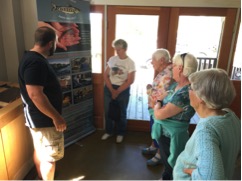
Senior Companion Program
The University of Maine Center on Aging Senior Companion Program in partnership with UMaine Extension is active in Washington County. There are fifteen Senior Companions, stationed around the county in the program. These volunteers provide in-home support and share research-based information with 115 folks who are home bound or isolated in some way, to help combat loneliness and offer friendship. The University of Maine Cooperative Extension provides office space and resources to make the job easier for the Program Coordinator to run an efficient and much needed program in Washington County.
Expanding Resource Directory for Food Entrepreneurs
Food-based enterprises and manufacturers require a wide range of information to help them successfully develop and market their products to consumers through various retail outlets. Three Cooperative Extension faculty members collaborated in the creation of a comprehensive online resource directory for aspiring or existing food manufacturers wanting to produce a specialty food product.
Since launching the Resource Directory in 2017, Cooperative Extension faculty have continued to enhance, expand, and refine the directory to increase access and usefulness. This year we initiated a social media campaign through Facebook, which has resulted in a 25% increase in the number of people using the resource.
Information in the directory is organized into broad sections for ease of use. Food entrepreneurs will find useful information on business planning (including samples of business plans for various food enterprises) marketing, financing options, and using food brokers, co-packers and distributors. Other sections identify important trade associations, trade shows, publications and more.
The Food Entrepreneurs Resource Directory is available on-line.
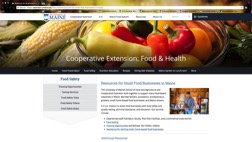
Business Management Workshops
Our office collaborated with Sunrise Economic Council to offer skill-building workshops for Washington County Entrepreneurs.
Starting Your Business: Planning for Success provided aspiring entrepreneurs with a blueprint for creating a realistic business plan, which is an important component to starting a successful business.
Pricing Products and Services offered participants solid guidance and advice about how to successful price a product or service to ensure the entrepreneur is covering all costs (including their labor) and making a profit.
2018 Agricultural Trade Show in Augusta, ME
Recipe to Market: Is It For Me? gave a brief overview of the specialty food industry, strategies for developing a food product and business tips for aiding the entrepreneur.
Food Trends featured the latest information on consumer food trends.
Business Consultations
Opportunities for aspiring or existing business owners to meet individually with knowledgeable business resources are available throughout the year. Consultations are free and individuals can meet as many times as needed.
4-H and Youth Development
The University of Maine Cooperative Extension 4-H program focuses on positive youth development, experiential learning, youth-adult partnerships and leadership skills. Over 1600 youth and 122 volunteers participated in various 4-H programs throughout the year. Highlights included:
4-H STEM Ambassadors- a partnership with University of Maine at Machias and the Sea Coast Mission’s EdGE After school program where trained UMM students facilitate hands-on science activities with students in grades 3-6.
4-H SPIN (SPecial INterest) Clubs– offer both volunteers and youth short-term 4-H experiences lasting six weeks focused on a specific project. Topics have included knitting, gardening, robotics, coding, and salsa making.
4-H Robotics Expo- an annual event hosted at University of Maine at Machias where over 60 youth between the ages of 9-14 practiced their public speaking skills, demonstrated their engineering and programming skills, and attended a variety of STEM-related workshops offered by UMM faculty.
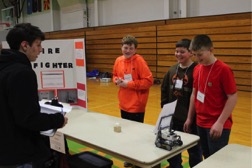
Hour of Code- In December, 4-H partnered with Maine Math and Science Alliance to offer one-hour events for youth and family members to learn basic coding skills through fast-paced puzzle-solving computer game. In Washington County we hosted eight events reaching over 70 youth and adults. Community events took place in Cherryfield, Princeton, Edmunds, East Machias, Machias, Calais, Jonesport, and Milbridge.
Summer of Science- In 16 communities statewide, more than 2,000 youths ages 8-13 participated in the Maine 4-H Summer of Science, which provided hands-on STEM learning activities in areas ranging from animal adaptation and bioremediation to chromatography and engineering design. Locally we offered programming in Lubec, Machias, Princeton and at UMM’s Clipper Camp reaching 280 youth. The program was in partnership with UMaine Established Program to Stimulate Competitive Research (EPSCoR).
2,000 youths ages 8-13 participated in the Maine 4-H Summer of Science
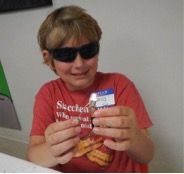
4-H Summer of Science.
4-H Tech Changemakers- Microsoft and National 4-H Council are partnering to provide digital literacy training and teen-led learning opportunities. Our local project, Community F.E.A.S.T. (Food, Education, Agriculture, Sustainability and Technology), will be utilized to help do the following:
- Educate people and raise awareness
- Highlight good work currently happening in the community
- Highlight volunteer opportunities
- Explore how to get teens/young adults to volunteer/get involved
For more information, check out the website youth created www.communityfeast.org.

Teen Science Cafes – in partnership with The Maine Math and Science Alliance, five sessions held at Narraguagus High School provided the opportunity for teens to meet people in STEM-related careers. Careers focused technology integration in emergency management and the following professions: EMT/ambulance, Game Warden/Search and Rescue, Drone Operator/flood zones, and Sheriff/accident reconstruction.

University of Maine Cooperative Extension Support for Washington County
Without statewide support, UMaine Extension would not be present in your county. Funds for projects are provided through the University of Maine, Federal Formula Funds, grants, contracts, and fees. Dollars from other sources support salaries and benefits for Extension specialists, county educators, Extension administration, computer equipment and networking, publications, postage, telephone, and travel.
| Washington County | CY2017 |
| Local Salaries and Benefits | 347,082 |
| Prorated Support from UMaine* | 420,345 |
| Computer Equipment and Networking | 786 |
| Statewide Animal Diagnostic Lab | 4,350 |
| Marketing, Publications, Video | 1,335 |
| Local Programming Supplies & Expenses | 4,909 |
| Postage | 1,162 |
| Telephone | 714 |
| Travel | 10,544 |
| TOTAL | $791,227 |
| * Prorated support from UMaine reflects travel, postage, telephone, computer equipment & networking, salaries & benefits for administrative and state-wide staff. | |
Statewide Extension Funding
As a unique partnership among federal, state and county governments, UMaine Extension uses funding from Maine counties and the University to match and leverage support from the United States Department of Agriculture, other federal grantors, state agencies and private foundations. Each county UMaine Extension office is also part of a statewide organization and the national Extension system.
This pie graph illustrates the financial resources for programs offered, supported and managed out of the Washington county office. Each year, Washington county tax dollars support the UMaine extension with physical office space, support staff salaries, office supplies, equipment and some programming expenses.
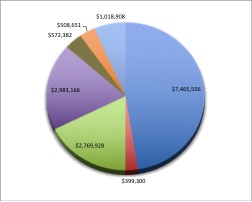
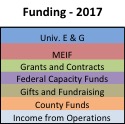
Statewide Highlights
Helping Grain Growers Expand to Serve High Value, Specialty Markets
The growing demand for locally grown and processed small grains, such as barley, oats, rye, and wheat, represents an economic opportunity for Maine’s farmers. Current and aspiring small grain farmers face a continuing need to improve their skills and capacities with grains that meet the quality standards of high-value specialty markets such as baking, brewing, and distilling for human consumption, as well as organic feed for dairy and egg production.
Grain farmers, processors, and buyers improved their skills, markets, and business viability as a result of Extension’s Extension’s Local Grains Program, including growing a new crop, changing a fertility, weed, or disease practice, and improving cleaning, drying and storage systems. These changes resulted in improved grain yields and quality, enhanced farm or grain business viability, and improved family quality of life. For organic small grains, production, yields, and value have increased dramatically in Maine over the last 5 years.
In 2016
- 2/3 of the processors reported having increased purchases and developed new sources and markets
- Maine grew 3.6 times more organic small grains compared with 2011 (1423 vs. 498 tons), on 2.5 times more acres
- 20% increase in yield
- $800,000 total value of organic small grains and pulses produced by Maine farmers
Researching Hops as a Maine Crop and Supporting Growers
Maine is home to 60 breweries producing over 200 beers, and is a leader in the production of craft beers. Yet most of the ingredients are imported into the state, including the hops that give our products their unique character. Developing a sustainable hops industry in Maine to supply the brewing industry will enhance product appeal and reduce reliance on imported ingredients. Maine breweries added $228 million to the state’s economy in 2016 and employed 2177 people.
UMaine Extension established a hops variety trial and demonstration planting at the Maine Agricultural Experiment Station at Highmoor Farm to determine suitable types and production practices in Maine and conducted an Extension Hops to educate new and potential grower.
Over 40 growers and potential growers visited the hops trial site. Eighty-nine new growers and potential growers attended the hops school, and 20 attended the hops twilight meeting. As a result of the trainings at least three new commercial hops plantings are being established, and a hops grower association is forming. Eighteen of the people attending the hops school intend to start a commercial hops yard within the next 3 years. Portland-based Allagash Brewing Co., which used over 115,000 pounds of local grains in 2017, has pledged to use 1 million pounds of Maine-grown grains annually by 2021.
Master Farmers and Dairy Grazing Apprentices
Maine has an aging population of dairy farmers. Dairy farming is an occupation that is both physically demanding occupation and difficult to enter without significant capital. Dairy is important to the state since it serves as a major supporter of many agricultural support businesses.
Many organizations have partnered to find ways to help this industry, including Maine Farmland Trust, MOFGA, Dairy Industry Association, Land for Good, and UMaine Extension. In 2016, supported by a grant from Stonyfield Yogurt, Wolfe’s Neck Farm (WNF) initiated the organic dairy training program to try to train a new generation of dairy farmers. WNF partnered with the Dairy Grazing Apprenticeship (DGA) to provide a two-year training program with education coordination from Extension.
Currently there are six Master Farmers in Maine, and five apprentices and WNF apprentices who are completing a two year, 4,000-hour training program. As an example of the utility of the program, a small organic dairy farmer recently was severely injured in a farming accident. WNF was able to work with Organic Valley, Extension, and the DGA program to provide trained apprentices to the farm to enable the it to stay in business during the farmer’s four-week recovery. Without DGA support they likely would have had to sell the cows.
Meeting the Demands of New and Emerging Milk Markets
U.S. organic agriculture operations are rising, with USDA data showing a 13 percent increase in certified organic farms and businesses between 2015 and 2016. With this growth, organic dairy processors and farmers are expanding into what used to be a niche market. A UMaine Extension assessment of organic dairy farmers in the Northeast revealed that to meet the demands of new and emerging markets these farmers need to extend the grazing season and implement practices consistent with entering the value-added milk market.
To extend the grazing season while improving the nutritional quality and content of omega-3 fatty acids in forage-based diets, Extension developed and assessed multi-cultivar mixtures of cool season perennial grass and legume species, and evaluated cool and warm season annual forages through agronomic research. We also assessed the utility of supplemental ground flaxseed to further bolster health-beneficial fatty acids (omega-3 and conjugated linoleic acid – CLA) and enhance the marketability of organic milk. Our findings were shared with farmers.
As a result:
- Over 100 northeastern organic dairy farmers transitioned their milking cows to high-forage or forage-only diets.
- Over 200 northeastern organic dairies adopted or fine-tuned the use of annual forage crops to extend the grazing season.
Fifty of the dairy farmers interviewed reported increased milk production and milk quality and reduced grain/feed purchases, with farmers saying improved forage yield
- and quality were the major contributors to these outcomes.
- Over 6,000 acres of organic summer annuals have been planted in NH, ME, VT, PA, and NY.
- Milk content of omega-3 fatty acids and CLA increased an average of 76 and 42%, respectively, in cows fed ground flaxseed compared with those not receiving flax supplementation.
“Working closely with this program helped me
reduce grain purchases by 25% and helped put
more money back in my pocket”.
“Help from this program allowed us to
apply soil amendments that boosted yield and quality.
We went from a deficit of feed to a surplus of hay
in just one year”.
Cooperative Extension Diagnostic and Research Laboratory
Accurate and early detection of animal diseases is important in limiting or eradicating the impacts of disease. With Maine’s continued growth of small farms getting animal health information into the hands of farmers is vitally important, as is having a state conduit for veterinarians to learn about livestock disease.
The Cooperative Extension Diagnostic and Research Laboratory serves the state’s veterinarians, livestock producers, and animal owners by performing diagnostic services that include necropsy, microbiology, virology, pathology, and special research support. Through Extension it links with industry to help control animal health related problems. A new Cooperative Extension Diagnostic and Research Laboratory will expand services to serve Maine’s over 8,000 farms.
In 2017, the lab tested over 10,000 samples, the majority of which were from farm animals. It tested over 7,000 poultry samples and over 3,000 milk samples, thus allowing farms of all sizes to operate with more assurance of healthy animals and healthy products. Poultry farms were able to meet their FDA-requirements for salmonella testing locally. Sheep and goat owners were able to find out whether their animals have enteric parasites, and what to do about it.
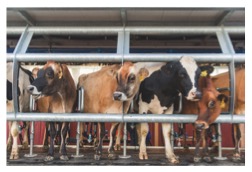
Salmonella Testing at the Cooperative Extension Diagnostic and Research Laboratory
Maine has a poultry industry worth $38,983,000. For any of Maine’s 8,200 farms that raise hens to sell eggs, testing for salmonella, especially Salmonella enterica subspecies enteritidis (SE), is a prudent plan. Mid- to large-scale farms are required by the FDA to test their environment for SE. UMAHL’s National Poultry Improvement Plan (NPIP) certified salmonella testing allows Maine poultry farms to meet FDA standards for Salmonella enteric enteritidis (SE) screening.
The Cooperative Extension Diagnostic and Research Laboratory provides timely and continuous access to SE testing to large and medium-scale poultry producers. The outcome of this work protects public health via prevention of human salmonellosis (SE) that might be acquired through eggs; it is estimated that the cost to the egg industry of an SE outbreak could be higher than 10% of production.
Master Food Preservers
Economic sustainability of farms is a daily issue faced by farmers, who understand that profitable farms are sustainable farms. Consumer purchasing power can significantly impact the profit base for farmers. Home food preservation education programs can increase consumer sales and ultimately profitability of farms by influencing point of purchase consumer behaviors to preserve (freeze, can, dry) fresh produce to use in the “off-season” to increase access to local foods.
UMaine Extension adult and youth food preservation education efforts are extended through our Master Food Preservers program. Master Food Preservers serve as volunteers and a community resource to provide the public with research-based information from Extension and USDA. In 2017, 64 Master Food Preserver volunteers contributed over 760 hours of food preservation education and community projects, reaching over 2190 people in 9 Maine counties. Volunteers taught 86 preserving workshops, staffed educational displays, and demonstrated at farmers’ markets, harvest festivals, agricultural fairs, and local food events.
The time volunteered by Master Food Preservers is the equivalent of over $18,000 in wages.
So You Want to Farm in Maine?
Current farmers thinking about changing farm enterprises and new farmers interested in starting a farm often lack skill, knowledge and confidence in areas such as access to capital, rules and regulations affecting agriculture operations, and marketing.
Since 2011, UMaine Extension has provided diverse educational outreach through its “So You Want to Farm in Maine” series to enhance the skills, business management knowledge, confidence of new and established farmers. Extension programs are live, live-streamed and archived, and reached 754 participants from all Maine counties and out-of-state. Topics included agriculture enterprise selection, business planning, record keeping, market research, regulations, and resource identification.
The series trained people to pursue farming as a viable career option.
- 69 percent increased knowledge about the importance of developing a business plan and the items a farm business plan should include.
- 67 percent increased knowledge about where to look for resources and information about their farm enterprise of interest including web resources, government agencies, universities, and other organizations.
- 67 percent increased knowledge about production and financial record keeping and the different methods that can be used including paper and electronic records.
- 64 percent increased knowledge about market research techniques that they could implement to refine the knowledge of markets for their agriculture products.
56 percent increased knowledge about the rules and regulations affecting agriculture
- enterprises and the agencies that enforce them.
Many students have already implemented new practices. As a result of attending the program the number of farmers increased from 27% to 73% and 3-4 people worked on the farm. In the fourth year, when the training qualified as FSA borrower training, farmers with FSA loans were able to complete their loan requirements and received nearly $313,000 in farm loans.
Supporting Maine’s Potato Industry
The $500 million potato industry is the largest agricultural sector in Maine, encompassing over 500 businesses generating over $300 million in annual sales, employing over 2600 people, and providing over $112 million in income to Maine citizens. The management of insects, diseases, weeds, and other pests is integral in sustaining a healthy Maine potato crop. Potato growers are increasingly relying on a multidisciplinary Integrated Pest Management (IPM) approach to ensure that Maine’s potato crop is pest and damage free while attempting to minimize the amount of pesticides that are applied.
Maine Extension’s Potato IPM Program impacts Maine’s 300 commercial potato growers and 48,000 acres of potatoes and has become an integral part of the Maine Potato Industry. The program also broadly impacts national and international growers who rely on the state’s seed crop. The project maintains nearly 100 specialized insect traps, coordinates a statewide network of electronic weather stations, and surveys 75 potato fields on a weekly basis for weeds, insects and diseases. IPM scientists track potential pest outbreaks to provide growers with current information on treatments to minimize the number of pesticide applications and maximize potato yield.
The economic impact from Extension’s pest monitoring and educational programs for the 2017 season is estimated at over $8.8 million.
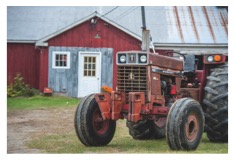
Statewide Highlights – Community & Economic Development
Supporting Local Business Expansion
The goal of UMaine Extension’s Food Safety programs is to ensure a safe food supply while reducing foodborne illness risks by teaching proper sanitation, food preservation, and food-handling practices. To that end Extension educators, specialists, and professionals conduct a variety of programs for Maine citizens and food businesses. In 2014, a gourmet gelato business, Gelato Fiasco, was operating out of a small commercial facility producing about 2,000 units a day, with 10 full time employees. The business’ sales had increased and they required an expansion of their current facility.
From 2014 to 2017 Extension staff provided technical and educational support to assist with general food safety, quality, sanitation, facility design, and regulations. UMaine Extension assisted the business with designing a new 10,000 sq. ft. facility, including scale-up and sourcing processing equipment. Gelato Fiasco is now safely producing and selling over 13,000 units per day out of their newly expanded facility and employing 24 full-time employees.
Facilitating Community Planning to Support Affordable Housing
Housing costs in southern Maine coastal communities are largely unaffordable to the local community’s workforce, with the majority of residents spending more than 30% of their income on housing.
UMaine Sea Grant and UMaine Extension facilitated a planning process with the Workforce Housing Coalition of the Greater Seacoast, the Town of Berwick, and community members. Workshops were held to engage the community in conversations about the disconnect between income and housing costs and the need to plan for the housing needs of the community’s workforce.
As a result of the workshops, recommendations were made to the community’s redevelopment plans. Community planning and actions provided the town with new resource and ideas, and a vision for the future that has attracted significant funding and investors. The Town applied for a U.S. EPA Brownfield Program grant, and was awarded $600,000, the largest single site grant in the history of the Brownfields grant program nationwide.
Parent Education: Laying the Foundation for Future Success and Wellbeing
The first three years of a child’s life are a critical time for growth and development. Investing in children, starting with the earliest years, produces significant long-term impacts for individuals and communities from reduced child abuse and neglect, lower health care costs to school success and better employment.
UMaine Extension Parenting Education Professionals are part of a statewide network of Maine Families Home Visiting Programs. In 2017, Extension’s two Maine Families Programs were endorsed by the Parents As Teachers National Center as exemplary Blue Ribbon Affiliates, delivering high-quality services to children and families. This makes both programs among the top performing early education and home visiting affiliates within the international Parents as Teachers network. Families receive services including home visits, group connections, child screening and connections to community resources, knowledge and resources to prepare their children for a stronger start in life and greater success in school.
Results:
- 79 percent of infants were breastfed at 6 months.
- 93 percent of primary caregivers were screened for depression.
- 91 percent of caregivers who used tobacco at enrollment received tobacco cessation referrals.
- 100 percent of children with positive screens for developmental delays received services in a timely manner.
- All enrolled families were assessed for basic needs and referred to services as appropriate.
Homemakers Promoting Community Based Adult Education
Extension Homemakers is a volunteer group that develops leadership skills, supports community causes, and promotes UMaine Extension’s educational programs in nine Maine counties. These organized programs are part of the statewide network of Extension Homemakers that participate in educational programs, and identify community projects, such as providing assistance to local food pantries or nursing homes or veterans groups, funding educational scholarships or youth camp programs.
In 2017, over 600 Extension Homemakers from over 40 Local Extension Homemaker Groups met and delivered or engaged in Extension programming involving over 3,100 participants and 321 programs including food, personal and community; nutrition and health; gardening and environmental, financial planning and consumer; personal growth; and cultural and creative arts.
In many Maine counties Extension Homemakers remain a traditional and vital part of the community fabric. They provide direct and indirect benefits in terms of volunteer hours, fundraising, and material donations. In 2017, the total estimated monetary value of the Extension Homemaker program to their communities was over $541,000.
College Students take Action on Food Insecurity
Since 2014, UMaine Extension has collaborated with the Maine Campus Compact to hold annual Maine Hunger Dialogues, inviting all Maine colleges and universities to send students and staff to learn about hunger on local, national, and global scales, and to leave with ideas and action plans for ending hunger in their regions. The events promote inter and intra-campus networking to capitalize on the diverse group.
In 2017, 80 student and staff from 14 campuses attended the Maine Hunger Dialogue where they developed new partnerships, assessed community needs and assets, and set goals and steps to reach them. Eleven teams successfully applied for Maine Hunger Dialogue grants to support new and existing initiatives. Teams used the funds to develop food recovery networks, initiate food pantries and resource hubs, donate fresh produce to food insecure students, conduct food drives and hunger awareness initiatives, host cooking on a budget and nutrition courses to food insecure adults and children, supported income refugee and immigrant residents with a healthy cooking workshop series, and helped build capacity between students and local Native American residents through providing a nutrition and food preservation workshop series. “Meal food pack-outs” (packaging healthy nonperishable meals) held at UMaine packed 107,562 meals that were distributed to food insecure students and community members.
Through the Maine Hunger Dialogue, Extension has strengthened partnerships with Maine Campus Compact, Good Shepherd Food Bank, Maine Corporations, UMaine System campuses, and other Maine Institutions of Higher Education.
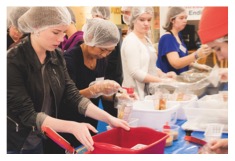
Analyzing Cruise Ship Tourism in Bar Harbor
Cruise Ship tourism is one of the fastest growing segments of Maine’s tourism industry. In 2016, 377 cruise ships, carrying 283,000 passengers were scheduled to visit Maine’s twelve ports, up 6 percent from 2015. Maine’s busiest port, Bar Harbor, has experienced remarkable growth, hosting 117 cruise ships carrying 163,000 passengers in 2016, a 36 percent increase since 2002. While the cruise ship industry is growing rapidly, little is known about the current demographic characteristics of these passengers or what their economic impact is on the Bar Harbor area economy.
The UMaine School of Economics and UMaine Extension examined the economic impacts of cruise ship passengers visiting Bar Harbor. The study found that cruise ship passengers spent an average of $108.21 on goods and services in the town of Bar Harbor during 2016. The total annual economic impact of cruise ship passenger spending, including multiplier effects, was over $20 million in sales revenue throughout the Bar Harbor area. Economic activity associated with this spending supported 379 full- and part-time jobs, and provided $5.4 million in wages and salaries. The results of this research were presented to the Bar Harbor Town Council, posted to the town’s website, and widely disseminated through television, radio, newspaper, Internet, and town meetings. Small business merchants in Bar Harbor have found the report very useful to their cruise ship passenger marketing efforts and local policymakers have used it to educate the public about the economic importance of cruise ship tourism to the Bar Harbor economy, especially during the shoulder seasons.
Providing Access to Capital: $8 Million Invested in Local Communities
Aspiring and existing entrepreneurs need capital to start, improve and expand their businesses to create good paying jobs for Maine people. Many business owners are challenged to secure adequate funding from traditional lenders to start or expand a business. However, by partnering with a regional economic development organization, traditional lenders like banks are able to increase access to capital for Maine businesses that otherwise would not be eligible for financing.
UMaine Cooperative Extension supports improved access to financing for Maine business through its collaboration with a regional economic development agency that provides SBA loan guarantees for prospective borrowers. As an active member of the Loan Review Committee, Extension provides guidance and oversight on credit and lending strategies, reviews loan applications and along with other business and community leaders arrives at a loan recommendation.
In fiscal year 2017 the Loan Review Committee approved 33 loans of over $3.2 million to 29 businesses. Over $4.9 million was leveraged bringing the total investment to over $8 million. Forty-eight jobs were created or retained, and seven of Maine’s 16 counties benefited from the program.
Statewide Highlights – 4-H Youth Development
Tech Wizards Students Helping Solve Real Community Problems
Tech Wizards is a youth mentoring program that uses STEM (science, technology, engineering and mathematics)
education and service learning to help youth learn life and workforce skills, improve academic performance, and aspire to post-secondary education, productive careers, and community engagement.
Students from Captain Albert Stevens Elementary School in Belfast are working with local naturalists, biologists and a drone pilot to survey and map their local watershed to gather and share data about the health of Wescott Stream, where they will release classroom-raised salmon in 2018. Native salmon are currently listed as endangered under the Endangered Species Act. Through Tech Wizards, the students joined their science teacher and 4-H mentors and:
- Used videography and photography to record findings from water quality tests and biotic indices for evaluation by the scientific community, and used a local drone pilot to identify and mapped species vectors and barriers to salmon migration.
- Researched several aquatic habitats using field guides.
- Critically evaluated the veracity of their research and received feedback from local experts.
- Practiced nature drawing techniques with a local naturalist.
- Developed a new outdoor classroom at Tanglewood
4-H Camp and Learning Center as a community service project. - Were introduced to career opportunities within science, technology, and art.
Statewide in 2017, Maine’s Tech Wizards program matched 275 students with community mentors in 7 schools. Students participated in ongoing fieldwork, citizen science initiatives, and service learning and were empowered to engage with their communities and contribute their time and skills to address important scientific questions, and to recognize that environmental stewardship is both the platform for their learning and an overarching life ethic.
4-H Youth Voice: Youth Choice
In Maine, 28 percent of youth are overweight or obese and 17 percent of children under age 19 live in poverty. One of the most common and preventable risk factors for premature death is consuming too few fruits and vegetables. In 2009, 72 percent of Maine adults consumed less than five servings of fruits or vegetables per day, while only 20 percent of Maine middle school students and 15 percent of Maine high school students consumed five servings of fruits or vegetables per day. In 2015, only 19 percent of Maine adults were meeting minimum recommendations for physical activity.
UMaine Extension implemented the national 4-H Youth Voice: Youth Choice program to mobilize under-served youth to take action around nutritional deficiencies, healthy food choices, and physical activity. The goal is to to train 50 teen teachers to educate 2000 underserved youth about nutrition and physical activity, to change knowledge, attitudes and behavior so youth will make healthy food, physical activity and lifestyle choices to reduce the risk of obesity and chronic disease later in life. A second goal is to create supportive community environments where healthy lifestyles are the norm.
Of teen teachers participating in Maine YVYC:
- 88 percent reported eating more fruits and vegetables.
- 66 percent reported eating less junk food.
- 71 percent reported drinking less soda.
- 88 percent reported drinking more water.
- 93 percent reported learning cooking skills to prepare healthy foods at home.
Of youth participating in Maine YVYC:
- 91 percent reported eating more fruits and vegetables.
- 81 percent reported eating less junk food.
- 88 percent reported drinking more water.
- 70 percent of youth participants reported being physically active for 60 minutes every day.
- 90 percent agreed that being active is fun, and will help them stay healthy.
Meeting Learning Standards through Lakeside and Open Air Classrooms
Educators in Maine K-12 schools are tasked with aligning their lessons in meaningful ways with local and national learning standards. To succeed in meeting standards and improving student learning, teachers are looking beyond the walls of their classrooms to integrate different academic content areas and engage students in active learning environments. Gardens, vernal ponds, forested land, and outdoor classrooms have become more popular at schools across Maine, but teachers often lack the professional support to know how to best use these spaces to incorporate curricula.
UMaine Extension’s 4-H Camp and Learning Centers’ Open Air Classrooms (OAC), at Tanglewood, Blueberry Cove and Lakeside Classroom at Bryant Pond provide residential, nature and school-based programs that help schools to meet learning standards.
In 2017, the 4-H Camp and Learning Centers conducted Lakeside and OAC programs and with over 5,000 students from 100 Maine school groups. Teachers find the OAC a valuable complement to their traditional classroom.
4-H@UMaine Gives Youth a Preview of the College Experience
Education after high school is critical to supporting skilled jobs in Maine. Engaging youth in getting college degrees helps to grow and strengthen Maine’s businesses and economy. Unfortunately, the number of Maine high school graduates enrolled in higher education lags at 40th in the nation. Although research recommends beginning to address college and career aspirations in elementary and middle grades, coordinating access to a college campus presents barriers for rural Maine communities.
UMaine Extension created 4-H@UMaine to provide a safe and supportive environment for Maine youth grades 6-12 to experience life on a college campus. Participants come to the UMaine campus and imagine the possibility of college attendance as they stay in campus residence halls, eat in the dining commons, get active in the student recreation center, and participate in hands-on workshops with UMaine students, staff, and faculty. While they are there, Extension also fosters healthy relationships using small-group settings led by trained adult leaders and teenage peer mentors.
In 2017, 4-H@UMaine hosted 55 youth (grades 6-10), 15 Teen Leaders (grades 9-12), and 27 adult staff and volunteers. In addition to the traditional youth experience for grades 6-10, college-ready teens took part in an exclusive experience that included pre-event training, planning roles as youth mentors, and workshops to further develop leadership skills and connect with campus staff. Of those attending 4-H@UMaine:
- 92% of all the youth indicated they learned about new career possibilities, helping to raise their career aspirations.
- 91% plan to go to college.
4-H Ambassadors Sparking Student Interest in STEM Careers
Relevant, meaningful, and authentic experiences in science, technology, engineering and math (STEM) are important to developing positive attitudes, increasing knowledge, and preparing Maine youth for the estimated 9 million STEM-related occupations projected between 2012 and 2022. Developing Maine youth’s STEM literacy is vital to ensuring that our state continues to thrive economically and socially. Given the remote and diverse communities to which Maine youth belong, informal education can help minimize inequities in rural youth STEM education and career pipelines.
In 2015, with the support of the UMaine System, UMaine Extension created the 4-H STEM Ambassador program, which trains college students as caring mentors to youth, and who facilitate STEM activities with them, and help them learn about college and careers.
Through this program, youth ages 8-14 come to view these Ambassadors as mentors and leaders in their community while also developing skills in STEM through hands-on activities. The program increases student leaders’ knowledge, and ability with facilitating STEM activities. It also increases university engagement in local communities that UMaine has not traditionally reached. Youth were excited that someone from UMaine came to share STEM activities. Student participants reported that without this program their instructional time with STEM would be reduced. As a result of this program participating youth have demonstrated positive attitudes, increased knowledge, and expanded interest in STEM and STEM careers.
The County Extension Act
The County Extension Act explains the role of county government in funding local Extension offices.
Cooperative Extension work shall consist of the giving of practical demonstrations in agriculture and natural resources, youth development, and home economics and community life and imparting information on those subjects through field demonstrations, publications and otherwise. For the purpose of carrying out this chapter, there may be created in each county or combination of two counties within the State an organization known as a “county extension association,” and its services available to all residents of a county. The county extension is viewed as a unique and important educational program of county government. The executive committee of each county extension association shall prepare an annual budget as requested, showing in detail its estimate of the amount of money to be expended under this chapter within the county of counties for the fiscal year. The executive committee shall submit to the board of county commissioners on a date requested by the county commissioners, and the county commissioners may, if they deem it justifiable, adopt an appropriate budget for the county extension program and levy a tax therefore. The amount thus raised by direct taxation within any county or combination of counties for the purposes of this chapter shall be used for the salaries of clerks, provision of office space, supplies, equipment, postage, telephone, a contribution toward the salaries of county educators and such other expenses as necessary to maintain an effective county extension program.1
1Excerpted from Title 7, Chapter 7 of the Maine Revised Statutes, §191–§195.
For more information contact:
University of Maine Cooperative Extension Washington County
28 Center Street
Machias, ME 04654
Phone: 207.255.3345 or 800.287.1542 (in Maine)
